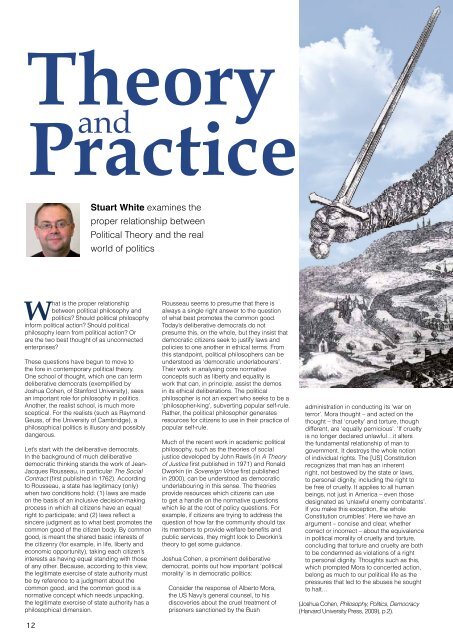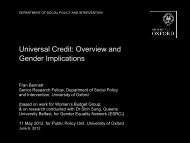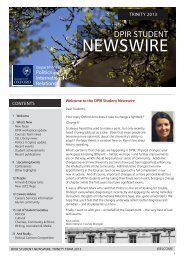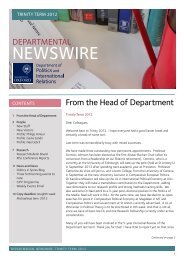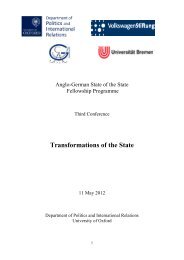Inspires - Department of Politics and International Relations ...
Inspires - Department of Politics and International Relations ...
Inspires - Department of Politics and International Relations ...
- No tags were found...
You also want an ePaper? Increase the reach of your titles
YUMPU automatically turns print PDFs into web optimized ePapers that Google loves.
TheoryPractice<strong>and</strong>Stuart White examines theproper relationship betweenPolitical Theory <strong>and</strong> the realworld <strong>of</strong> politicsWhat is the proper relationshipbetween political philosophy <strong>and</strong>politics? Should political philosophyinform political action? Should politicalphilosophy learn from political action? Orare the two best thought <strong>of</strong> as unconnectedenterprises?These questions have begun to move tothe fore in contemporary political theory.One school <strong>of</strong> thought, which one can termdeliberative democrats (exemplified byJoshua Cohen, <strong>of</strong> Stanford University), seesan important role for philosophy in politics.Another, the realist school, is much moresceptical. For the realists (such as RaymondGeuss, <strong>of</strong> the University <strong>of</strong> Cambridge), aphilosophical politics is illusory <strong>and</strong> possiblydangerous.Let’s start with the deliberative democrats.In the background <strong>of</strong> much deliberativedemocratic thinking st<strong>and</strong>s the work <strong>of</strong> Jean-Jacques Rousseau, in particular The SocialContract (first published in 1762). Accordingto Rousseau, a state has legitimacy (only)when two conditions hold: (1) laws are madeon the basis <strong>of</strong> an inclusive decision-makingprocess in which all citizens have an equalright to participate; <strong>and</strong> (2) laws reflect asincere judgment as to what best promotes thecommon good <strong>of</strong> the citizen body. By commongood, is meant the shared basic interests <strong>of</strong>the citizenry (for example, in life, liberty <strong>and</strong>economic opportunity), taking each citizen’sinterests as having equal st<strong>and</strong>ing with those<strong>of</strong> any other. Because, according to this view,the legitimate exercise <strong>of</strong> state authority mustbe by reference to a judgment about thecommon good, <strong>and</strong> the common good is anormative concept which needs unpacking,the legitimate exercise <strong>of</strong> state authority has aphilosophical dimension.12Rousseau seems to presume that there isalways a single right answer to the question<strong>of</strong> what best promotes the common good.Today’s deliberative democrats do notpresume this, on the whole, but they insist thatdemocratic citizens seek to justify laws <strong>and</strong>policies to one another in ethical terms. Fromthis st<strong>and</strong>point, political philosophers can beunderstood as ‘democratic underlabourers’.Their work in analysing core normativeconcepts such as liberty <strong>and</strong> equality iswork that can, in principle, assist the demosin its ethical deliberations. The politicalphilosopher is not an expert who seeks to be a‘philosopher-king’, subverting popular self-rule.Rather, the political philosopher generatesresources for citizens to use in their practice <strong>of</strong>popular self-rule.Much <strong>of</strong> the recent work in academic politicalphilosophy, such as the theories <strong>of</strong> socialjustice developed by John Rawls (in A Theory<strong>of</strong> Justice first published in 1971) <strong>and</strong> RonaldDworkin (in Sovereign Virtue first publishedin 2000), can be understood as democraticunderlabouring in this sense. The theoriesprovide resources which citizens can useto get a h<strong>and</strong>le on the normative questionswhich lie at the root <strong>of</strong> policy questions. Forexample, if citizens are trying to address thequestion <strong>of</strong> how far the community should taxits members to provide welfare benefits <strong>and</strong>public services, they might look to Dworkin’stheory to get some guidance.Joshua Cohen, a prominent deliberativedemocrat, points out how important ‘politicalmorality’ is in democratic politics:Consider the response <strong>of</strong> Alberto Mora,the US Navy’s general counsel, to hisdiscoveries about the cruel treatment <strong>of</strong>prisoners sanctioned by the Bushadministration in conducting its ‘war onterror’. Mora thought – <strong>and</strong> acted on thethought – that ‘cruelty’ <strong>and</strong> torture, thoughdifferent, are ‘equally pernicious’. ‘If crueltyis no longer declared unlawful…it altersthe fundamental relationship <strong>of</strong> man togovernment. It destroys the whole notion<strong>of</strong> individual rights. The [US] Constitutionrecognizes that man has an inherentright, not bestowed by the state or laws,to personal dignity, including the right tobe free <strong>of</strong> cruelty. It applies to all humanbeings, not just in America – even thosedesignated as ‘unlawful enemy combatants’.If you make this exception, the wholeConstitution crumbles’. Here we have anargument – concise <strong>and</strong> clear, whethercorrect or incorrect – about the equivalencein political morality <strong>of</strong> cruelty <strong>and</strong> torture,concluding that torture <strong>and</strong> cruelty are bothto be condemned as violations <strong>of</strong> a rightto personal dignity. Thoughts such as this,which prompted Mora to concerted action,belong as much to our political life as thepressures that led to the abuses he soughtto halt…(Joshua Cohen, Philosophy, <strong>Politics</strong>, Democracy(Harvard University Press, 2009), p.2).


